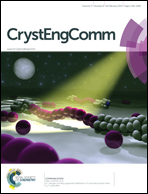Reliable palladium nanoparticle syntheses in aqueous solution: the importance of understanding precursor chemistry and growth mechanism†
Abstract
Reliable protocols for the synthesis of palladium nanoparticles (Pd-NPs) in aqueous solution are rarely found and the corresponding growth mechanisms often remain unknown. Furthermore, syntheses of Pd-NPs always demand the use of stabilizing agents which are often unfavorable for catalytic applications. In this contribution, the importance of the palladium precursor chemistry as a prerequisite for any reliable Pd-NP synthesis in aqueous solution is shown. This includes a detailed study of the influence of the precursor chemistry on the nanoparticle growth mechanism. The findings enable the controlled modification of a common synthetic protocol (i.e. the reduction of a palladium precursor with NaBH4) to obtain sub-5 nm Pd-NPs without the use of any stabilizing agent. In addition, it is also shown that such mechanistic studies are not only of great importance to the development of novel synthetic procedures. Exemplarily, the successful transfer of the synthesis from lab- to large-scale is demonstrated.


 Please wait while we load your content...
Please wait while we load your content...